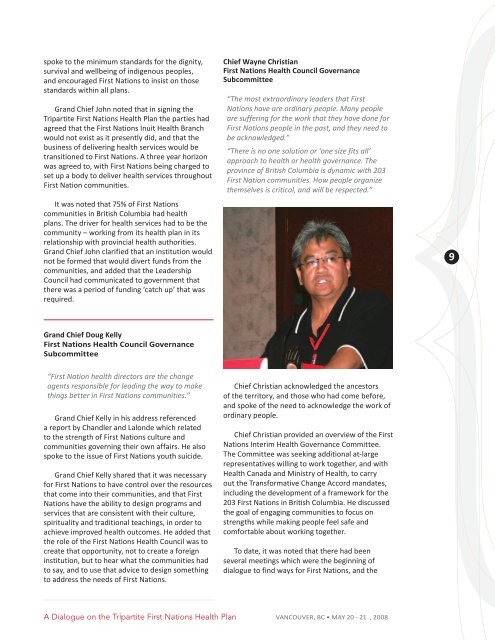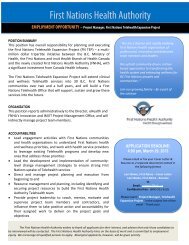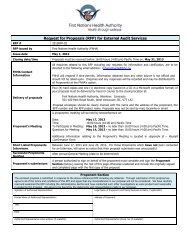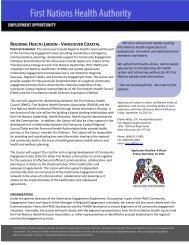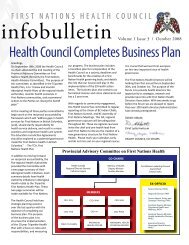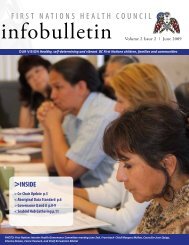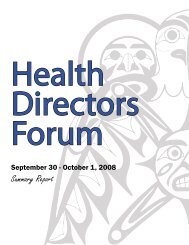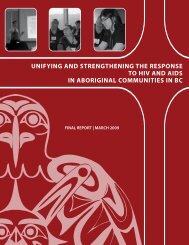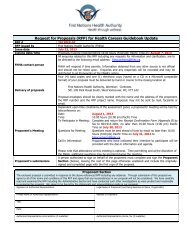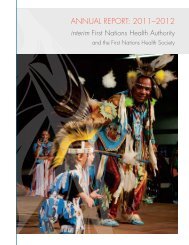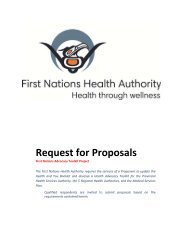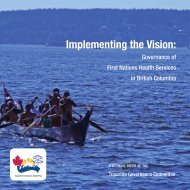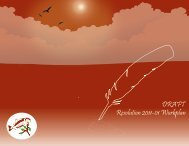pdf download - First Nations Health Council
pdf download - First Nations Health Council
pdf download - First Nations Health Council
You also want an ePaper? Increase the reach of your titles
YUMPU automatically turns print PDFs into web optimized ePapers that Google loves.
spoke to the minimum standards for the dignity,<br />
survival and wellbeing of indigenous peoples,<br />
and encouraged <strong>First</strong> <strong>Nations</strong> to insist on those<br />
standards within all plans.<br />
Grand Chief John noted that in signing the<br />
Tripartite <strong>First</strong> <strong>Nations</strong> <strong>Health</strong> Plan the parties had<br />
agreed that the <strong>First</strong> <strong>Nations</strong> Inuit <strong>Health</strong> Branch<br />
would not exist as it presently did, and that the<br />
business of delivering health services would be<br />
transitioned to <strong>First</strong> <strong>Nations</strong>. A three year horizon<br />
was agreed to, with <strong>First</strong> <strong>Nations</strong> being charged to<br />
set up a body to deliver health services throughout<br />
<strong>First</strong> Nation communities.<br />
It was noted that 75% of <strong>First</strong> <strong>Nations</strong><br />
communities in British Columbia had health<br />
plans. The driver for health services had to be the<br />
community – working from its health plan in its<br />
relationship with provincial health authorities.<br />
Grand Chief John clarified that an institution would<br />
not be formed that would divert funds from the<br />
communities, and added that the Leadership<br />
<strong>Council</strong> had communicated to government that<br />
there was a period of funding ‘catch up’ that was<br />
required.<br />
Chief Wayne Christian<br />
<strong>First</strong> <strong>Nations</strong> <strong>Health</strong> <strong>Council</strong> Governance<br />
Subcommittee<br />
“The most extraordinary leaders that <strong>First</strong><br />
<strong>Nations</strong> have are ordinary people. Many people<br />
are suffering for the work that they have done for<br />
<strong>First</strong> <strong>Nations</strong> people in the past, and they need to<br />
be acknowledged.”<br />
“There is no one solution or ‘one size fits all’<br />
approach to health or health governance. The<br />
province of British Columbia is dynamic with 203<br />
<strong>First</strong> Nation communities. How people organize<br />
themselves is critical, and will be respected.”<br />
9<br />
Grand Chief Doug Kelly<br />
<strong>First</strong> <strong>Nations</strong> <strong>Health</strong> <strong>Council</strong> Governance<br />
Subcommittee<br />
“<strong>First</strong> Nation health directors are the change<br />
agents responsible for leading the way to make<br />
things better in <strong>First</strong> <strong>Nations</strong> communities.”<br />
Grand Chief Kelly in his address referenced<br />
a report by Chandler and Lalonde which related<br />
to the strength of <strong>First</strong> <strong>Nations</strong> culture and<br />
communities governing their own affairs. He also<br />
spoke to the issue of <strong>First</strong> <strong>Nations</strong> youth suicide.<br />
Grand Chief Kelly shared that it was necessary<br />
for <strong>First</strong> <strong>Nations</strong> to have control over the resources<br />
that come into their communities, and that <strong>First</strong><br />
<strong>Nations</strong> have the ability to design programs and<br />
services that are consistent with their culture,<br />
spirituality and traditional teachings, in order to<br />
achieve improved health outcomes. He added that<br />
the role of the <strong>First</strong> <strong>Nations</strong> <strong>Health</strong> <strong>Council</strong> was to<br />
create that opportunity, not to create a foreign<br />
institution, but to hear what the communities had<br />
to say, and to use that advice to design something<br />
to address the needs of <strong>First</strong> <strong>Nations</strong>.<br />
Chief Christian acknowledged the ancestors<br />
of the territory, and those who had come before,<br />
and spoke of the need to acknowledge the work of<br />
ordinary people.<br />
Chief Christian provided an overview of the <strong>First</strong><br />
<strong>Nations</strong> Interim <strong>Health</strong> Governance Committee.<br />
The Committee was seeking additional at-large<br />
representatives willing to work together, and with<br />
<strong>Health</strong> Canada and ministry of <strong>Health</strong>, to carry<br />
out the Transformative Change Accord mandates,<br />
including the development of a framework for the<br />
203 <strong>First</strong> <strong>Nations</strong> in British Columbia. He discussed<br />
the goal of engaging communities to focus on<br />
strengths while making people feel safe and<br />
comfortable about working together.<br />
To date, it was noted that there had been<br />
several meetings which were the beginning of<br />
dialogue to find ways for <strong>First</strong> <strong>Nations</strong>, and the<br />
VANCOUVER, bC • mAY 20 - 21 , 2008


